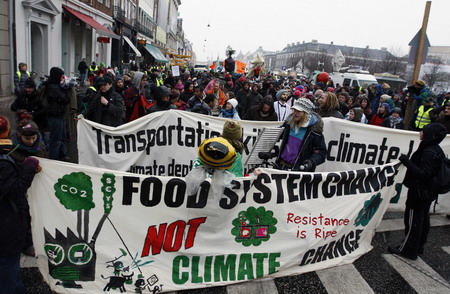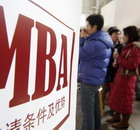Global General
Climate conference emits its share of carbon
(Agencies)
Updated: 2009-12-16 10:12
 |
Large Medium Small |
|
 Protesters hold banners during a demonstration in Copenhagen December 15, 2009. Copenhagen is the host city for the United Nations Climate Change Conference 2009, which lasts from December 7 until December 18. [Agencies] |
Climate summits, which attract thousands of delegates and are often held in far-flung or glitzy locations like Barcelona and Rio de Janeiro, are easy targets for critics.
The last big climate conference -- in 2007 on the Indonesian island of Bali -- blew through 47,000 tons of carbon, equal to the daily emissions of Marseilles, one of the biggest cities in France. Delegates were criticized for running their air conditioners as they chatted in beach-side villas.
Organizers from the Danish government said they were doing everything they could to minimize the conference's carbon footprint.
They have reduced emissions 20 percent through a number of energy efficiency measures, promoted public transport, encouraged hotels to provide environmentally certified rooms and installed efficient lighting in the conference center, according to Jan-Christoph Napierski, who heads conference logistics for the Danish Foreign Ministry.
They are offsetting the rest of the emissions by investing in a program to upgrade antiquated brick kilns in Bangladesh with the help of the World Bank.
"Bangladesh is one of the countries hardest hit by climate change and there's a great need to assist the country with technology and capital contributions," said conference president Connie Hedegaard. "In addition, the project will result in significant environmental improvements for the local community, where particle pollution from the existing old brick works is clearly visible."












